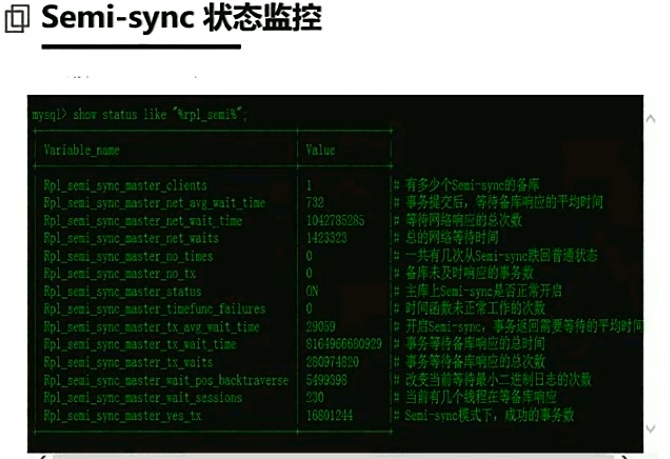mysql: c:底层 C++:相对上层 主备复制:主库通知备库来取 MYSQL复制源代码代码:SQL文件夹 int start_slave_thread( #ifdef HAVE_PSI_INTERFACE PSI_thread_key thread_key, #endif pthread_handler h_func, mysql_mutex_t *start_lock, mysql_mutex_t *cond_lock, mysql_cond_t *start_cond, volatile uint *slave_running, volatile ulong *slave_run_id, Master_info* mi) { pthread_t th; ulong start_id; int error; DBUG_ENTER("start_slave_thread"); if (start_lock) mysql_mutex_lock(start_lock); if (!server_id) { if (start_cond) mysql_cond_broadcast(start_cond); if (start_lock) mysql_mutex_unlock(start_lock); sql_print_error("Server id not set, will not start slave"); DBUG_RETURN(ER_BAD_SLAVE); } if (*slave_running) { if (start_cond) mysql_cond_broadcast(start_cond); if (start_lock) mysql_mutex_unlock(start_lock); DBUG_RETURN(ER_SLAVE_MUST_STOP); } start_id= *slave_run_id; DBUG_PRINT("info",("Creating new slave thread")); if ((error= mysql_thread_create(thread_key, &th, &connection_attrib, h_func, (void*)mi))) { sql_print_error("Can't create slave thread (errno= %d).", error); if (start_lock) mysql_mutex_unlock(start_lock); DBUG_RETURN(ER_SLAVE_THREAD); } if (start_cond && cond_lock) // caller has cond_lock { THD* thd = current_thd; while (start_id == *slave_run_id && thd != NULL) { DBUG_PRINT("sleep",("Waiting for slave thread to start")); PSI_stage_info saved_stage= {0, "", 0}; thd->ENTER_COND(start_cond, cond_lock, & stage_waiting_for_slave_thread_to_start, & saved_stage); /* It is not sufficient to test this at loop bottom. We must test it after registering the mutex in enter_cond(). If the kill happens after testing of thd->killed and before the mutex is registered, we could otherwise go waiting though thd->killed is set. */ if (!thd->killed) mysql_cond_wait(start_cond, cond_lock); thd->EXIT_COND(& saved_stage); mysql_mutex_lock(cond_lock); // re-acquire it as exit_cond() released if (thd->killed) { if (start_lock) mysql_mutex_unlock(start_lock); DBUG_RETURN(thd->killed_errno()); } } } if (start_lock) mysql_mutex_unlock(start_lock); DBUG_RETURN(0); } /** Slave IO thread entry point. @param arg Pointer to Master_info struct that holds information for the IO thread. @return Always 0. */ pthread_handler_t handle_slave_io(void *arg) { THD *thd= NULL; // needs to be first for thread_stack bool thd_added= false; MYSQL *mysql; Master_info *mi = (Master_info*)arg; Relay_log_info *rli= mi->rli; char llbuff[22]; uint retry_count; bool suppress_warnings; int ret; int binlog_version; #ifndef DBUG_OFF uint retry_count_reg= 0, retry_count_dump= 0, retry_count_event= 0; #endif // needs to call my_thread_init(), otherwise we get a coredump in DBUG_ stuff my_thread_init(); DBUG_ENTER("handle_slave_io"); .. } /** Slave SQL thread entry point. @param arg Pointer to Relay_log_info object that holds information for the SQL thread. @return Always 0. */ pthread_handler_t handle_slave_sql(void *arg) { THD *thd; /* needs to be first for thread_stack */ bool thd_added= false; char llbuff[22],llbuff1[22]; char saved_log_name[FN_REFLEN]; char saved_master_log_name[FN_REFLEN]; my_off_t saved_log_pos= 0; my_off_t saved_master_log_pos= 0; my_off_t saved_skip= 0 if (exec_relay_log_event(thd,rli)) ...................................... } mysql_execute_command(THD *thd) { 。。。。。。。。。。。。 case SQLCOM_SLAVE_START: { mysql_mutex_lock(&LOCK_active_mi); if (active_mi != NULL) res= start_slave(thd, active_mi, 1 /* net report*/); else my_message(ER_SLAVE_CONFIGURATION, ER(ER_SLAVE_CONFIGURATION), MYF(0)); mysql_mutex_unlock(&LOCK_active_mi); break; 。。。。。。。。。。。。。。。。。。。 } /** Top-level function for executing the next event in the relay log. This is called from the SQL thread. This function reads the event from the relay log, executes it, and advances the relay log position. It also handles errors, etc. This function may fail to apply the event for the following reasons: - The position specfied by the UNTIL condition of the START SLAVE command is reached. - It was not possible to read the event from the log. - The slave is killed. - An error occurred when applying the event, and the event has been tried slave_trans_retries times. If the event has been retried fewer times, 0 is returned. - init_info or init_relay_log_pos failed. (These are called if a failure occurs when applying the event.) - An error occurred when updating the binlog position. @retval 0 The event was applied. @retval 1 The event was not applied. */ static int exec_relay_log_event(THD* thd, Relay_log_info* rli) { DBUG_ENTER("exec_relay_log_event"); /* We acquire this mutex since we need it for all operations except event execution. But we will release it in places where we will wait for something for example inside of next_event(). */ mysql_mutex_lock(&rli->data_lock); /* UNTIL_SQL_AFTER_GTIDS requires special handling since we have to check whether the until_condition is satisfied *before* the SQL threads goes on a wait inside next_event() for the re 。。。。。。。。。。。。 } */ exec_res= apply_event_and_update_pos(ptr_ev, thd, rli); apply_event_and_update_pos(Log_event** ptr_ev, THD* thd, Relay_log_info* rli) class Query_log_event: public Log_event { LEX_STRING user; LEX_STRING host; protected: Log_event::Byte* data_buf; public: const char* query; const char* catalog; const char* db; /* If we already know the length of the query string we pass it with q_len, so we would not have to call strlen() otherwise, set it to 0, in which case, we compute it with strlen() */ uint32 q_len; uint32 db_len; uint16 error_code; ulong thread_id; /* For events created by Query_log_event::do_apply_event (and Load_log_event::do_apply_event()) we need the *original* thread id, to be able to log the event with the original (=master's) thread id (fix for BUG#1686). */ ulong slave_proxy_id; /* Binlog format 3 and 4 start to differ (as far as class members are concerned) from here. */ uint catalog_len; // <= 255 char; 0 means uninited /* We want to be able to store a variable number of N-bit status vars: (generally N=32; but N=64 for SQL_MODE) a user may want to log the number of affected rows (for debugging) while another does not want to lose 4 bytes in this. The storage on disk is the following: status_vars_len is part of the post-header, status_vars are in the variable-length part, after the post-header, before the db & query. status_vars on disk is a sequence of pairs (code, value) where 'code' means 'sql_mode', 'affected' etc. Sometimes 'value' must be a short string, so its first byte is its length. For now the order of status vars is: flags2 - sql_mode - catalog - autoinc - charset We should add the same thing to Load_log_event, but in fact LOAD DATA INFILE is going to be logged with a new type of event (logging of the plain text query), so Load_log_event would be frozen, so no need. The new way of logging LOAD DATA INFILE would use a derived class of Query_log_event, so automatically benefit from the work already done for status variables in Query_log_event. */ uint16 status_vars_len; /* 'flags2' is a second set of flags (on top of those in Log_event), for session variables. These are thd->options which is & against a mask (OPTIONS_WRITTEN_TO_BIN_LOG). flags2_inited helps make 。。 } */ 主库/备库 挂了,数据不一致 1062 :主健冲突,备库大于主库数据,,主库少了数据 ,主库挂了 1032:备库比主库数据少 set session sql_log_bin=0;

semi-sync安装---master master 安装过程: install plugin rpl_semi_sync_master soname 'semisync_master.so' show variables like 'rpl_semi_sync_master_enabled' 值为ON,表示开启;否则检查失败原因 set global rpl_semi_sync_master_timeout=100000(利于观察) set global rpl_semi_sync_master_wait_no_slave=1 (是默认值,表示即使没有slave 也会以等待过期时间结束)
